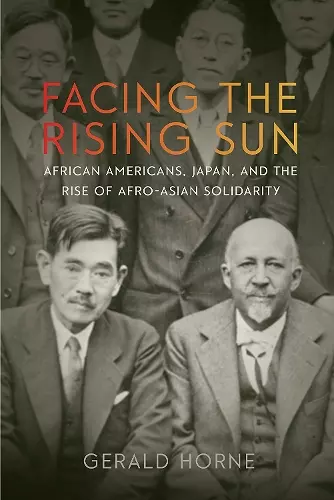Facing the Rising Sun
African Americans, Japan, and the Rise of Afro-Asian Solidarity
Format:Hardback
Publisher:New York University Press
Published:16th Jan '18
Should be back in stock very soon

The surprising alliance between Japan and pro-Tokyo African Americans during World War II
In November 1942 in East St. Louis, Illinois a group of African Americans engaged in military drills were eagerly awaiting a Japanese invasion of the U.S.— an invasion that they planned to join. Since the rise of Japan as a superpower less than a century earlier, African Americans across class and ideological lines had saluted the Asian nation, not least because they thought its very existence undermined the pervasive notion of “white supremacy.” The list of supporters included Booker T. Washington, Marcus Garvey, and particularly W.E.B. Du Bois.
Facing the Rising Sun tells the story of the widespread pro-Tokyo sentiment among African Americans during World War II, arguing that the solidarity between the two groups was significantly corrosive to the U.S. war effort. Gerald Horne demonstrates that Black Nationalists of various stripes were the vanguard of this trend—including followers of Garvey and the precursor of the Nation of Islam. Indeed, many of them called themselves “Asiatic”, not African. Following World War II, Japanese-influenced “Afro-Asian” solidarity did not die, but rather foreshadowed Dr. Martin Luther King’s tie to Gandhi’s India and Black Nationalists’ post-1970s fascination with Maoist China and Ho’s Vietnam.
Based upon exhaustive research, including the trial transcripts of the pro-Tokyo African Americans who were tried during the war, congressional archives and records of the Negro press, this book also provides essential background for what many analysts consider the coming “Asian Century.” An insightful glimpse into the Black Nationalists’ struggle for global leverage and new allies, Facing the Rising Sun provides a complex, holistic perspective on a painful period in African American history, and a unique glimpse into the meaning of “the enemy of my enemy is my friend.”
An absorbing study of Afro-Asian solidarity. Horne’s prodigious archival research is ingeniously framed by questions that challenge some of the assumptions made about African American civil rights struggles in the twentieth century ... Scholars should seriously consider the views of pro-Tokyo black nationalists and their contributions to the dismantling of Jim Crow laws. -- Modernism/modernity
Horne’s masterful historiography makes Facing the Rising Sun an important text for black internationalism, Afro-Asian studies, and other related fields. -- The Journal of African American History
In his ever-expanding corpus, Gerald Horne continues to hone in on the question of contingency -- that is, why the seemingly intractable problem of racism in the United States would give way at a particular moment in history. In Facing the Rising Sun, Horne focuses on Black Nationalists who took a pro-Tokyo position during the Pacific War, a period in which Japan's revolt against the West rattled white supremacy. They forged solidarity with Japan, America's enemy, and amid the crisis over race and the very messiness of politics, the world around them changed even as they paid a high price. This work reminds us that in the cause of Black liberation, then and now, the analysis of the confluence of world and domestic affairs matters in the struggle against racism and empire. -- Yuichiro Onishi, author of,Transpacific Antiracism: Afro-Asian Solidarity in 20th-Century Black America, Japan, and Okinawa
Through uncovering a rich, dynamic history of pro-Japanese views among U.S. Black nationalists during the Depression and World War II, Gerald Horne has produced a brilliant book that provides a powerful model for writing about transnational African American history, global white supremacy, and Afro-Asian solidarities. -- Erik S. McDuffie ,author of Sojourning for Freedom
Alongside Race War!: White Supremacy and the Japanese Attack on the British Empire and other works, this monograph adds to Dr. Horne's prolific oeuvre concerning the multifaceted international context of movements of opposition and solidarity against Euro-American Empire. Horne again showcases the expansive and imaginative -- as well as at times contradictory and problematic -- transnational activities, ideology, and agency of U.S. Black political struggle. This work is another reminder of why he continues to be a leading historian and intellectual on global affairs, and moreover a model of radical intellectualism and activism for generations of today and tomorrow. -- Robeson Taj Frazier,author of The East Is Black: Cold War China in the Black Radical Imaginationier
The book offers a wealth of detail on some of the overlooked actors in this drama. Their dialogues presaged the intoxicating rise and tragic fall of postwar Afro-Asian movements, whose collective-cooperative aspirations sketched a beautiful vision of solidarity. -- Diplomatic History
ISBN: 9781479848591
Dimensions: unknown
Weight: 499g
240 pages